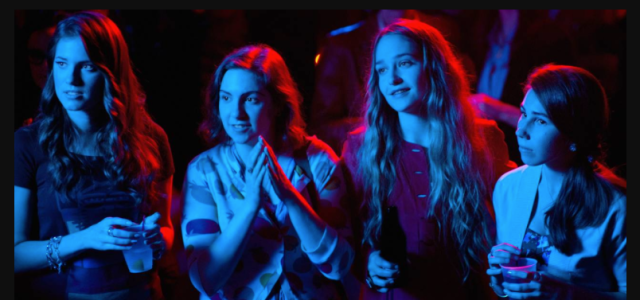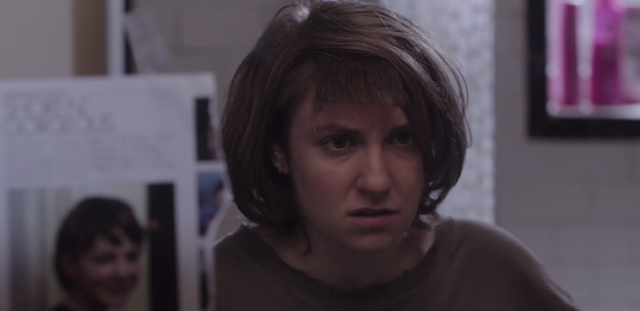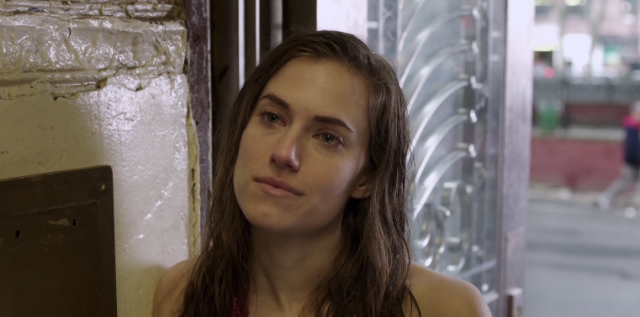By Lydia Geisel

(Still from Season 1, Episode 4)
As I patiently await the arrival of the final season of Girls (premiering February 12), I can’t help but reminisce over favorite past episodes. After viewing Gold Diggers of 1933 this week, it only seems fitting to continue a conversation about the female-centric narrative.
Girls follows the friendships of four 20-something women living in Manhattan who can never quite seem to figure out what they want. Led by Hannah Horvath (Lena Dunham), an aspiring writer suffering from a touch of OCD and a whole lot of bad choices, the show follows her provocative, endearing, and explosive relationships—both romantic and other. All in all, the series highlights the ups and downs of young women on their pursuit of happiness. From getting fired to getting married to getting a bad haircut, there’s something to be learned from every neurotic and surprisingly relatable character on the show.

(Still from Season 2, Episode 10 – Hannah)
Over the decades we’ve seen shows get women’s friendships so right and, so wrong (Desperate Housewives?). But, as with any critical analysis, I think it’s important to keep in mind that any and every media is of course a response to (and product of) its specific historical moment. Having read Laura Mulvey’s influential essay “Visual Pleasure and Narrative Cinema” (1973) before in the context of art history, I find it crucial to consider how the theory of the male gaze has been explored in recent years. New shows, like Insecure, which places focus on the relationships specifically between black female characters, or like Orange is the New Black, seem to almost be a direct critique of traditional female roles, the male viewer as active participant, and anti-feminist narratives in Hollywood.

(Still from Season 5, Episode 6 – Marnie)
Even a show that I love so dearly and have watched enthusiastically for years, Sex and the City, is unfortunately a prime example of a series that came short of pushing boundaries by prioritizing conversations that primarily revolve around men and the art of attraction. Girls, on the other hand, reveals a story that is seemingly closer to the truth. The characters are vulnerable, confused, regretful, flawed, and at times, repulsive, as Allison Williams who plays Hannah’s best friend, Marnie, in the hit show told ELLE UK. They’re easy to love and easy to hate all at the same time. But, most importantly, their appearance and romantic relationships don’t define them.

I have not seen Girls, but I’ve heard great things about the show. One comment I hear the most frequently is that the actresses are all very real and relatable. This allows the audience to identify with the characters in a less artificial way than Sex and the City. I think it’s interesting how girl posses have transformed over the years. I wonder what affects these changes have had on females? -Caitlin Herlihy
I’ve heard so many good things about this show. I should really go check it out some day! HBO has produced many good shows with an “indie” feeling to them, in my mind Girls would be one of them. As a male I really appreciate stories told from genuine female perspectives. And I love realistic representations of life and people in movies and TV shows!
-Kevin Yu
I am anxiously awaiting the new season as well! There is something about Girls that is a more raw or realistic look into the relationship between this group of friends, and I think you made a good point of this by drawing on other series that may not be as realistic, but put the friendship of women at the forefront of the show. Can’t wait to hear about what you think about the new season!
Catherine Maier
As I was reading your post, I too, thought of Sex and the City. Even though it is one of my favorite television shows to aimlessly watch, the older I get, the harder it is for me to watch due to the apparent male gaze. Girls is a great example of a show that is breaking these boundaries in television and film
Katherine Naylor
Check out Leah Haynes’s chapter: .tizrapublisher.com/critical-media-studies-sitcoms/182